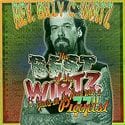
If Mojo Nixon’s a little too nitro-powered for you, but you think Ray Stevens’ stuff could use the flavor that only a night trapped in a roadhouse can provide, then you might want to check out The Reverend Billy C. Wirtz and his First House of Polyester Worship. Live, he’s a sight to behold, testifying like a tent revival preacher and playing a boogie-woogie blend of piano with a fire that’s usually heard only on old Jerry Lee Lewis records. As for the blues, Wirtz has a surprisingly genuine claim, having studied under Sunnyland Slim in Chicago and even playing organ on 1971’s The London Muddy Waters Sessions.
So how do we end up in 2001, with Wirtz singing songs about Elvis (“WWED”, “The King Gets a Day Job”), mild family dysfunction (“Mama Was a Deadhead”, “Daddy Was a Sensitive Man”), wrestling (“Grandma vs. The Crusher”, “Sleeper Hold On Satan”), and classic rock purgatory (“Margarita Hell”, “Freeway to Stairbird”)? Well, the answers probably as much in the gospel show that opened his eyes as a teen as it is in the tattoos that cover his body. For revelations of that sort, The Best of the Wirtz isn’t the place to go — although we do find out in the inspired verbal mayhem of “You Are Nobody!” that he was a ‘rasslin manager in Florida. The Best of the Wirtz provides an adequate, but not definitive, summation of Wirtz’s career — six albums worth — up to this point. Sure, all the elements are here, from midgets to Mennonites to Jesse Helms, but many gems from Wirtz’s career are overlooked (I know, a common complaint of compilations) in favor of tracks with shorter shelf life.
Highlights include the studio version of “Roberta”, as well as “The Visitor” (an Elvis cut that rivals Red Sovine’s “Phantom 309” and “Teddy Bear” for tear-jerking power). Fans of The Simpsons’ 7-11 owner Apu will enjoy “Baby Got Dot”, a mixture of Deepak Chopra and Tupac Shakur, and “The Rev. vs. The Computer” is an inspired bit of ad-libbing when Wirtz’s electronic keyboard acts up on stage. Overall, though, Wirtz’ sense of wide-eyed lunacy and his sharp wit fails to consistently come through. The Best of the Wirtz does manage to keep everything from sounding the same, which is a danger when Wirtz hits the same piano groove a couple of songs in a row. However, the stage is Wirtz’s medium, and a better introduction to this politically incorrect hybrid of Elvis and Jimmy Swaggart might be a live album like 1994’s Pianist Envy.
